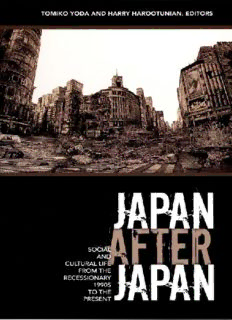Table Of ContentJapanAfterJapan
asia-pacific: culture, politics, and society
Editors:ReyChow,HarryHarootunian,andMasaoMiyoshi
©2006DukeUniversityPress
Allrightsreserved
PrintedintheUnitedStatesofAmericaonacid-freepaper(cid:5)
DesignedbyJenniferHill
TypesetinScalabyTsengInformationSystems,Inc.
LibraryofCongressCataloging-in-PublicationDataappear
onthelastprintedpageofthisbook.
CONTENTS
1 Introduction HarryHarootunianandTomikoYoda
16 ARoadmaptoMillennialJapan TomikoYoda
54 TheUniversityandthe‘‘GlobalEconomy’’:TheCasesofthe
UnitedStatesandJapan MasaoMiyoshi
81 TheUniversity,Disciplines,NationalIdentity:WhyIsThereNo
FilmStudiesinJapan? MitsuhiroYoshimoto
98 Japan’sLongPostwar:TheTrickofMemoryandtheRuseofHistory
HarryHarootunian
122 NationalSubjectivityandtheUsesofAtonementintheAgeofRecession
J.VictorKoschmann
142 ‘‘GiveMeJapanandNothingElse!’’:
Postcoloniality,Identity,andtheTracesofColonialism LeoChing
167 ‘‘YouAsians’’:OntheHistoricalRoleoftheWestandAsiaBinary NaokiSakai
195 RevengeandRecapitationinRecessionaryJapan MarilynIvy
216 The‘‘WildChild’’of1990sJapan AndreaG.Arai
239 TheRiseandFallofMaternalSociety:
Gender,Labor,andCapitalinContemporaryJapan TomikoYoda
275 Representation,RealityCulture,andGlobalCapitalisminJapan EricCazdyn
299 MonsieurleCapitalandMadamelaTerreDoTheirGhost-Dance:
GlobalizationandtheNation-State YutakaNagahara
331 New-AgeFetishes,Monsters,andFriends:PokémonCapitalism
attheMillennium AnneAllison
358 OtakuMovement ThomasLaMarre
395 ADriftingWorldFair:CulturalPoliticsofEnvironmentintheLocal/Global
ContextofContemporaryJapan YoshimiShunya
415 AngelusNovusinMillennialJapan SabuKohso
439 Contributors
443 Index
Introduction
HarryHarootunianandTomikoYoda
M
ore than a decade has passed since the bursting of Japan’s bubble
economy,anddespitesomeintermittentsignsofrecovery,thepro-
longedeconomicdownturnthatbeganintheearly1990sstillweighs
heavilyonthenation.Inthecourseofthedecade,anoptimisticviewthat
thenation’seconomicstagnationismerelyatemporarydownturninabusi-
nesscycle,anadjustmentoftheexcessivegrowthandtheinflationofasset
pricesinthelatterpartofthe1980s,wasabandoned.Whiletheprognosis
of Japan’seconomicfutureremainsuncertain,thefactthattherecession-
arydecadehascatalyzedawide-reachingtransformationinJapanesesociety
seemsindisputable.Duringthe1990s,thewavesofbankruptcyandunem-
ploymentreachedpost-1940speaks,palpablyerodingthevauntedlifetime
employmentsystemandcuttingdeeplyintothecoreofpostwarJapanese
socialcompactandthesenseofnationalidentity.Manyclaimthatthefull
revivaloftheeconomywouldentailafurtherprocessofrestructuring—a
processthatwillcontinuetoexactserioustollsontheJapanesesocietyin
fractiousandunevenways.
Theeconomicwoesduringthedecadehavegreatlytarnishedtheimage
of Japan, built up over decades, as a nation of an unending economic ex-
pansion.The significance of the 1990s as a major historical conjuncture,
however,mustalsobeunderstoodthroughthewaysinwhichitmarkedthe
dissolutionofthestatusquoinanothersense.Thedecadeappearstohave
signaledthelong-deferredendofthepostwar,whichJapanhaskeptalive
as vigorously as the state once tried to prolong the life of the former em-
perorHirohitoashelaydying.Thisnarrativeofthelongpostwarbeganwith
theUnitedStatesconspicuouslyconspiringwithJapaneseandtheimperial
houseimmediatelyafterthewartoabsolvetheemperorfromwarresponsi-
bility,whichwouldsparehimfromgoingtotrialintheTokyoMilitaryTri-
bune.Bypreservingtheemperorandthedynasty,theUnitedStatesliterally
underminedtheveryreformsithadimplementedtoeliminateprewarfas-
cismandtoputintoplacethefoundationsofagenuinesocialdemocratic
structure.Atthesametime,theUnitedStatesalsoservedastheprincipal
alibiforJapan’sfailuretoachieveitspostwaraspirations,howeveritwasde-
fined(eventhoughtheretentionoftheemperormorethanamplyfulfilled
themostprimaryoftheseambitions).The‘‘compensation’’allegedlypaid
was one in unprecedented economic affluence and military protection, if
notthepromisedsocialdemocracy.
Thesignificantdeclineofthispartnershipwasexposedinthecourseof
the1990s,providinguswithanopportunitytoreexaminethetangledhis-
toricalrelationshipbetweenthesetwocountriessincetheendofthewar.
OncetheColdWarhadended,theUnitedStates,withitscontroloverthe
globalmarket,andwithoutrealthreatstonationalsecurityapartfromthe
rhetoricofso-calledroguestatesandChina,recognizedthattheutilityof
the postwar it shared with Japan had outrun its productivity. While the
UnitedStateshadbeenprogressivelydetachingitselffromJapanthrough-
out the 1990s, Japanese found themselves persuaded to cling even more
tenaciouslytoarelationship,whichfordecadeshadexcludedallothersfor
thestatusofapartnershipthatwasequalinnameonly.TheJapanesede-
siretoretainthedependentrelationshipithaslivedwiththeUnitedStates
pointstoareluctancetoletgoofthedistortedhistorythathasretainedfor
itboththeprincipleandprincipalofpoliticalauthorityandthusthewhole
ofitsmodernhistory.IftheJapanesearealwaysperplexedwhenforeigners,
andespeciallyAsians,constantlydemandofthemanaccountoftheircon-
ductinthewar,itisbecausetheywerepermittedbytheU.S.militaryoccu-
pationtoretaintheirprewarhistoricalexperienceandmakeitafundamen-
talpartofthenewpostwarorder,unliketheGermanswhowereforcedto
confrontandquestionitasaconditionofsheddingbutnotforgettingit.
If the recognition of the end of the postwar hit a Japanese society al-
readyreelingfromthemillennialmalaiseofthe1990s,theeventsof9/11
ontheothersideoftheglobewouldconvincethemthatthenewcentury
announcedevenworsethingstocome.America’snewimperialturnafter
9/11(returnisabetterdescription),warinAfghanistanandtheinvasionof
Iraq,simplyconfirmedtheworstof Japanesefearsandanxietiesthattheir
status as America’s partner had always been an empty fiction.While the
2 harry harootunian and tomiko yoda
Japanesepressreverberatedwithnewsoftheshockattendingthecollapse
oftheWorldTradeCenterbyMuslim,notablySaudiArabian,suicidebomb-
ers(thatmusthavemomentarilyrecalledforsomethespecterofkamikaze
missions in the last days of World War II), writers on the Left (what was
leftofthem)andtheRightcouldsharealargereservoirofagreementover
what the event might reveal about the future of Japan and its relation to
theUnitedStates.September11anditsaftermathpresentedtothemapic-
tureofJapannolongermooredtotheso-calledpartnershipwiththeUnited
Statesandthelongpostwarthathadbothhouseditandshieldeditfromthe
restoftheworld.Thereemergedacommonacknowledgmentofanational
existence no longer exclusively bonded to an interminable Americanized
postwarandapartnershipemptiedofallmeaningbutdeceptionandbad
faithonbothsides.
AsJapanwasrecognizingthatitsworldcouldnolongerconsistofAmer-
icaalone,theUnitedStateshadalreadyembarkedonamissionthatsetitself
againsttheworldorthatportionofitnotyetassimilatedtoitsimperialex-
emplarsandexpectations.InthenewAmericanimperium,Japanwasas-
signedtheroleithadalwaysplayed,assimplyapliantclientstateof long
andloyalstanding,readytorespondtoimperialdictates(readasrequests)
onamoment’snoticebyjoiningthecoalitionofthewilling.AndJapan,in
turn,demonstratedtheswiftnessofitswillingnesstorespondwithmoney
and personnel. (In the previous Gulf War, Japan only contributed cash.)
Compliance with the American demand has simply affirmed Japan’s true
clientstatusintheimperium,occupyingasemicolonizedposition.
ForboththeJapaneseLeftandRight,themaintenanceoftheequalpart-
nershipwasabasicconditionforsustainingtherelationsbetweentwocoun-
tries. The blatant betrayal of this comforting illusion, therefore, elicited
strongresponsesfrombothcamps.Whatseemstohaveseizedtheatten-
tion of left-leaning observers in the wake of the imperial wars unleashed
after 9/11 was the manifest desire to emphasize an exceptional universal-
ism of the American state according to the tenets of a political theology.
KanSanjunputitbestwhenheconcludedthatAmerican-styleuniversal-
ismmeansonlythattheUnitedStatesistheworld;andtheworld,nowre-
1
ducedtoAmerica,merelyaspirestorealizea‘‘universalhumanvalue.’’ This
sentiment, by no means exceptional these days, has easily seen through
the claims employed to underwrite yet another ‘‘just war’’ fought by the
UnitedStatesthatimmediatelydemandsaresponsefromAmerica’ssup-
posedpartnerslikeJapan.Theeffectof9/11hasbeentostirmemoriesof
Americanism and its baneful history Japanese have lived since 1945 and,
introduction 3
Description:The prolonged downturn in the Japanese economy that began during the recessionary 1990s triggered a complex set of reactions both within Japan and abroad, reshaping not only the country’s economy but also its politics, society, and culture. In Japan After Japan, scholars of history, anthropology,

